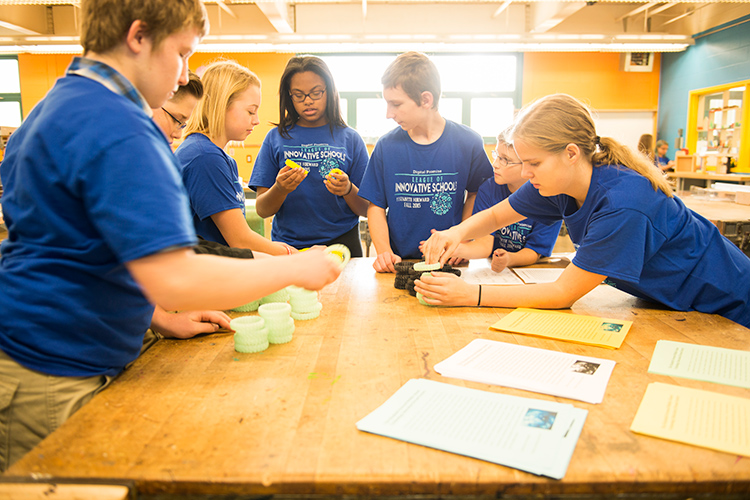
League of Innovative Schools brings forward thinkers to Pittsburgh
The ballroom of the Hotel Monaco was a sea of tables and bobbing heads. Educators, tech entrepreneurs, researchers and thought leaders bantered with one another about student projects, everything from yurts to rockets to robots.
The biannual meeting of the League of Innovative Schools brought some of the most forward-thinking educators in education here Oct. 25-27. Convened by Digital Promise, a Washington, D.C. nonprofit formed by Congress in 2008, the League’s broad agenda is simple: to give young Americans the knowledge and skills they need to compete in the global economy.
The League is comprised of 73 public schools in 33 states who are recognized leaders in the national Maker education movement. Selection is based on the successful work they are doing to transform their curriculums through technology and creative learning initiatives such as 3D printing, robotics, microprocessors and “smart” materials.
The movement is nothing short of a learning revolution.
Three school districts in Pittsburgh count themselves among the League’s cadre of innovative districts: Avonworth, South Fayette and Elizabeth Forward. The three served as hosts for the three-day event that focused on the theme of forming community partnerships.

Pittsburgh is a good example of a learning community that has cultivated great partners through the Remake Learning Network, says Sara Schapiro, director of the League.
“Great ideas have risen through these partnerships and by bringing different disciplines, ideas and energy to the schools,” she says. “What we’re seeing here and what they will take away is this pervasive emphasis on STEAM, making, computational thinking and creating.”
On this particular afternoon, energy bounces off the walls as educators at the tables—many of whom have never met—engage in stakeholder mapping, an exercise that gets everyone thinking up ways to find educational partners in their own communities and beyond.
“The League works with schools in affluent, poor, urban and rural communities,” explains Schapiro. “Each needs help to meet the challenges they face. There are sources in each community that schools can draw from. (For example), if your kids are in Arizona and have never seen the ocean, connect them with an aquarium.”
The theme of forming partnerships wove through several field trips and a showcase of Remake Learning partners. At the Children’s Museum, local initiatives like FabLab, HearMe, Saturday Light Brigade and CMU’s CREATE Lab Satellite Network and students shared their work.
During a morning classroom visit at South Fayette, students worked with South Side-based Schell Games to beta test their game Lexica. At Elizabeth Forward, grad students at CMU’s Entertainment Technology Center tested their projects with the help of students.
“At all three campuses, we saw kids at every age level creating and producing,” says Schapiro. “Kids in the middle school were programming code to fly drones in the gym, which I’ve never seen before. Kindergarteners were let loose in a Make Shop. I was totally blown away.”
Critics may ask how effective these new learning strategies are. In truth, the evidence is in the outcomes, says Schapiro. “When you go into a school district like South Fayette and see how deeply engaged the kids are, it’s obvious. They don’t even look up they are so excited and enthralled.”
As for the adults, the level of enthusiasm expressed was inspiring, says Aileen Owen, director of technology and innovation at South Fayette. “One person told me he had an educational epiphany and wants to bring people back with him to Pittsburgh. Another from Silicon Valley said we are eons ahead of them. Can you imagine?”
“There is probably no better region where the League has a presence that illustrates the power of school and non-school partnerships than Pittsburgh,” says Ryan Coon, program manager at the Sprout Fund. “Pittsburgh’s whole network approach is a very intentional approach to building projects.”
To drive the point home, the Sprout Fund released the first print edition of the Remake Learning Playbook, an ambitious effort to open source the “code” for creating collaborative learning networks.
Both a digital book and deck of cards, the Playbook documents both the process and outcomes of the work orchestrated by Remake Learning to create a community-wide learning innovation network.
“We hope people will use the Playbook as a resource to build a similar collaborative learning network in their community,” says Coon.
Adds Schapiro: “We hope that this work isn’t seen as innovative or cutting-edge but as the day-to-day work of schools. Every single day children have the opportunity to engage in learning and technology at a deeper level. We hope other districts will look at what the League has done and adopt those strategies.”